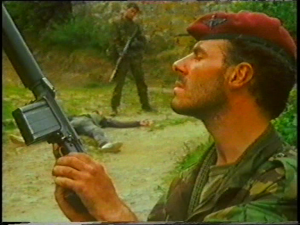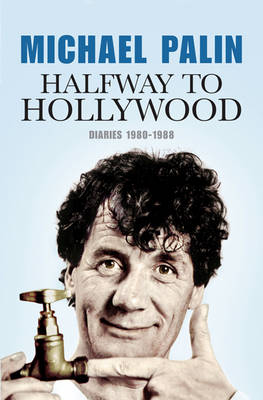by DAVID ROLINSON
Screen Two; Writer: AFN Clarke; Director: Alan Clarke; Producer: Terry Coles

The first production to be shown in the Screen Two strand, Contact was broadcast on BBC2 at 10.10pm on Sunday 6 January 1985.1 An account of British Army patrols around the border in South Armagh, Contact was an appropriate start for Screen Two given its contemporary concerns, politically sensitive subject matter and distinctive style. Filmed between 6 and 29 August 1984, Contact was directed by Alan Clarke.2 It is one of the highlights of Clarke’s astonishing body of work. Jim Naughton’s review of Contact is largely characteristic of the critical acclaim that it received: “a crisp, tight, elegant piece of work, wonderfully shot […] by Philip Bonham Carter and making brilliant use of sound”, the film “found a new angle on Northern Ireland, which is more than can be said for most programmes about that […] province”.3 Typically for a Clarke piece it achieved more acclaim abroad, winning the Golden Leopard’s Eye at the Locarno International Film Festival, where the jury praised the “intelligence and precision with which the camera describes the story of a British patrol in Northern Ireland while leaving the spectator free to judge”.4 Clarke described the win as a “high spot” of his career, “absolutely great”.5 However, there was another Clarke at work on Contact whose own contribution has been underexplored: its writer, AFN Clarke…
This article builds upon one sub-section of Chapter 3 of Dave Rolinson, Alan Clarke (Manchester: Manchester University Press, 2005), which was reissued in paperback in 2011. It was a shame that the paperback was just a straight reprint because most of it was written in the restrictive logistical circumstances of my Ph.D. (October 2000-Summer 2004) and I think the Contact chapter in particular would benefit from updating and revising with the facilities and information that I now have. This article marks the start of that process of revision. ↩
Filming dates taken from Contact’s BBC Programme-as-Broadcast file, viewed at the BBC Written Archives Centre. ↩
Jim Naughton, ‘The good spies come back’, The Listener, 10 January 1985, p. 33. ↩
Jury quoted in Paul Johnson, ‘BBC says film on informers was not delayed’, The Guardian, 15 August 1985. Interestingly given some of the reviewer comments quoted later in this essay, the Guardian piece describes Contact as “A BBC documentary on Northern Ireland”. The Contact news is at the bottom of a piece about the BBC denying alleged censorship of a programme about informers in Northern Ireland, On the Word of a Supergrass. ↩
Billy the Kid and the Green Baize Vampire publicity material, viewed at British Film Institute library. ↩

 g, production, post-production, critical reception and awards nominations (plus Palin’s unusually scathing comment that the London Film Festival were ‘Snobs’ to pass on it).
g, production, post-production, critical reception and awards nominations (plus Palin’s unusually scathing comment that the London Film Festival were ‘Snobs’ to pass on it).